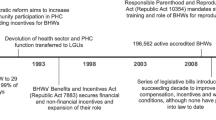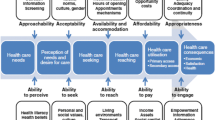Abstract
Since the early 1990s, the United Kingdom has seen several initiatives designed to improve the quality of cancer palliative care in the community. We report on the evaluation of a project that took place in the rural county of Powys in Wales in which a group of general practitioner clinical facilitators (GPCFs) sought to raise the overall standard of palliative care among primary health care teams (PHCTs). The evaluation was conducted over 3 years and made use of several methods: interviews with facilitators and other key stakeholders at regular intervals throughout the project; a survey of PHCT members at two time points; an analysis of patterns of opioid prescribing in the county before and during the project; monitoring of referrals to specialist palliative care services out of county; and an analysis of place of death of those dying from cancer. The evaluation found that local general practitioners (GPs) were willing to work as facilitators and that they made contact with over two thirds of those in the PHCTs. Facilitators undertook a variety of clinical, educational and service development initiatives but did report on problems of role definition and time management. There were no marked changes in patterns of referral to specialist palliative care or in place of death, but there was some evidence to suggest that the facilitators had an influence on their colleagues’ opioid prescribing patterns.



Similar content being viewed by others
References
Barclay S, Todd C, McCabe J, Hunt T (1999) Primary care group commissioning of services: the differing priorities of GPs and DNs for palliative care services. Br J Gen Pract 49:181–186
Blyth AC (1990) Audit of terminal care in general practice. Br Med J 300:983–986
Boyd KJ (1995) The role of specialist home care teams: views of general practitioners in South London. Palliat Med 9:138–144
Cartwright A (1990) The role of the general practitioner in caring for people in the last year of their lives. King’s Fund: London
Cox I, Waine C, Bolas R, et al. (1995) General Practice Palliative Care Facilitator Project 1992–1994: Report of an evaluation. R Coll Gen Pract, London
Department of Public Health & Dyfed Powys Health Authority (2001) Powys Local Health Group: Health social factors 2001. Dyfed-Powys Health Authority, Dyfed
Ellershaw J, Wilkinson S (2003) Care of the dying: A pathway to excellence. Oxford University Press, Oxford
Field D (1998) Special not different: General practitioners’ accounts of their care of dying people. Soc Sci Med 46(9):1111–1119
Fowell A, Finlay I, Johnstone R, Minto L (2002) An integrated care pathway for the last two days of life: Wales-wide benchmarking in palliative care. Int J Palliat Nurs 8(12):566–574
Grande GE (1997) Difficulties of symptom control and general practitioners’ knowledge of patients’ symptoms. Palliat Med 11:399–406
Ingleton C, Hughes P, Noble B, Gray H, Clark D (2003) An evaluation of Macmillan GP Clinical Facilitator Project: the postholders’ perspective. Primary Health Care Research and Development 4(2):177–186
Ingleton C, Morgan J, Hughes P, Noble B, Evans A and Clark D (2004) Carer satisfaction with end-of-life care in Powys, Wales: a cross sectional survey. Health and Social Care in the Community 12(1):43–53
Munday D, Barnett M, Dale J (1999) Are GP out of hour’s co-operatives failing the dying. AUDGP Annual General Meeting (Poster), London
National Council for Hospice and Specialist Palliative Care Services (NCHSPCS) (1995) Specialist palliative care: A Statement of definitions. National Council for Hospice and Specialist Palliative Care Services, London
Noble B, Hughes P, Ingleton C, Clarke D. (2001) Rural palliative care needs: a survey of primary care professionals in Powys, Wales. Int J Palliat Nurs 7:610–615
Noble B, Hughes P, Ingleton C, Berg J, Clark D (2003) Impact of the Powys Macmillan GP Facilitator Project: views of health care professionals. Int J Palliat Nurs 9(12):528–533
Robbins M (1998) Evaluating palliative care: Establishing the evidence base. Oxford University Press, Oxford
Royal College of General Practitioners and Cancer Relief Macmillan Fund General Practice Palliative Care Facilitator Project (1992–1994). R Coll Gen Pract, London
Shipman C, Addington-Hall JM, Barclay S, Briggs J et al (2001) Educational opportunities in palliative care: what do general practitioners want? Palliat Med 15:191–196
Shipman C, Thomas M, Addington-Hall JM (2001b) Do GP Facilitators make a difference in palliative care? Paper presented at the Palliative Care Research Forum, June 2001. Royal College of Physicians: London
Thomas K (2003). Caring for the dying at home: Companions on the journey. Radcliffe Medical Press, Oxford
Thomas K, Millar D (2001) Catalyst for change: Macmillan facilitators in cancer and palliative care. Palliative Care Today 2001:54–56
Acknowledgements
We extend our thanks to Macmillan Cancer Relief for funding support and the Dyfed-Powys Research Ethics Committee for granting ethical approval. We are grateful to all study participants who gave their time generously. Thanks also to the University of Sheffield Statistical Services Unit for assistance with survey analysis; Pat Reardon and colleagues at Health Solutions Wales for providing GP prescribing data for Powys; Margaret Jane, Joanne Brodie and Pauline Hutchinson for administrative and secretarial support.
Author information
Authors and Affiliations
Corresponding author
Rights and permissions
About this article
Cite this article
Clark, D., Ingleton, C., Hughes, P. et al. Evaluation of a scheme to enhance palliative cancer care in rural Wales. Support Care Cancer 12, 683–691 (2004). https://doi.org/10.1007/s00520-004-0673-7
Received:
Accepted:
Published:
Issue Date:
DOI: https://doi.org/10.1007/s00520-004-0673-7




